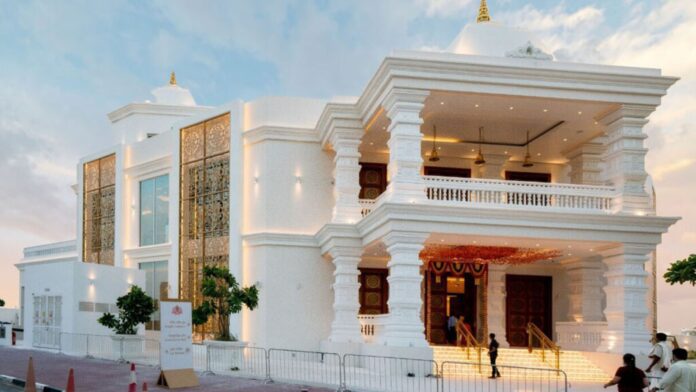In the bustling heart of Bur Dubai, a place resonating with profound significance is about to undergo a transformative shift, leaving a trail of nostalgia among its residents. This sacred enclave, entwined with the rich history of the UAE, has been a daily retreat where rituals and history converge seamlessly.
For Divyesh Kumar Shaholia and many like him, the temple complex is more than just bricks and mortar; it encapsulates the essence of childhood. Dating back to 1958, the Bur Dubai Shiv Mandir and Gurudwara have been cherished places where generations have woven memories amidst incense and prayers.
Since the tender age of seven, Divyesh has felt an unbreakable bond with this historic temple, a connection to cultural traditions passed down through the ages. However, the winds of change are sweeping across the horizon.
Notices discreetly placed at the temple complex entrances have sent ripples through the community, heralding the imminent relocation of the Shiva temple from Bur Dubai to the Jebel Ali temple by January 3, 2024. This upcoming move has stirred a wave of emotions, triggering heartfelt conversations within the community as residents grapple with the impending farewell to a sanctuary that has been a constant presence in their lives.
End of an Era
In conversations with Khaleej Times, Dubai old-timers like the Shaholias, who have been part of the UAE fabric for 48 years, express a sentiment akin to witnessing the end of an era. Divyesh Kumar Shaholia’s father and uncles, proprietors of gold workshops and stores in Bur Dubai, have seen the temple as a place of worship and an integral aspect of their lives.
For Divyesh, not a single day has passed without a visit to the temple. “I still recall my grandmother sitting and making garlands with other women in the temple. We used to go for the evening darshan (visit) every day after school for several years at a stretch. Then we would go to our shop in Bur Dubai and distribute the ‘Prasad’ (sweets) to everyone there. This was part of our routine, our life.”
He fondly remembers the grandeur of festivals, especially Janmashtami, where around 10,000 devotees would converge at the old temple grounds. The surge in festival attendees posed logistical challenges for the Dubai Police as worshippers spilled into the area. As the use of cars became more prevalent, finding parking spaces became a significant hurdle.
Divyesh also reminisces about when the family purchased incense sticks (agarbatti) in bulk from India, adding a fragrant touch to the temple rituals.
Conclusion
The impending relocation of the Bur Dubai Shiva temple to Jebel Ali marks the end of an era, leaving a profound void in the hearts of its devotees. The memories and traditions forged within the temple’s sacred precincts will endure as the community prepares to bid farewell to a cherished sanctuary. The echoes of prayers, the fragrance of incense, and the shared moments of spirituality will linger, bridging the gap between the past and the future.
In the face of change, the community stands united, honoring the legacy of the Bur Dubai temple while embracing the possibilities that the new location may unfold. The journey of faith and cultural heritage continues, with the temple’s imminent relocation becoming a chapter in the rich tapestry of the UAE’s history.





